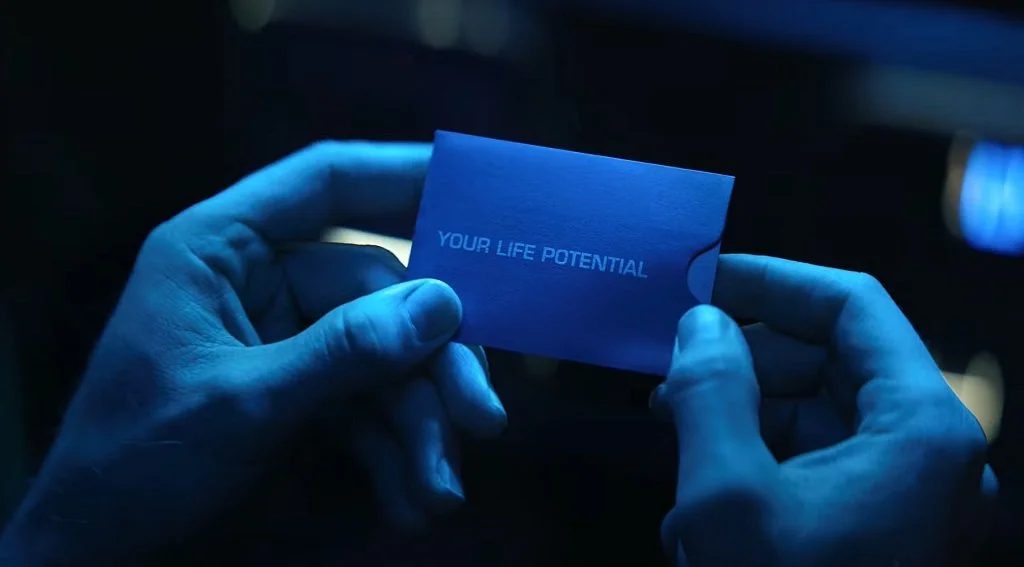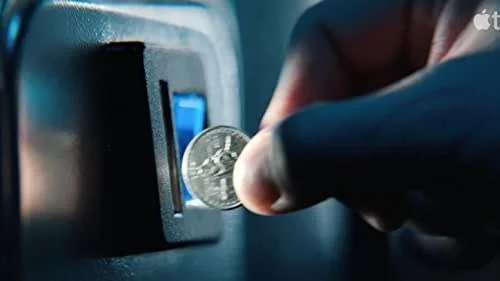Apple TV’s new show isn’t the fluffy, quirky comedy you might think it is
Maybe you missed the Ted Lasso train. Maybe, like me, you still haven’t come around on Jason Segel, so you were hesitant to watch Shrinking (which I’m glad I did, despite my reservations about Segel). Maybe someone split your brain in two and you watched Severance at work, so you don’t remember it when you’re at home reading this. So you didn’t watch Wolfwalkers because you thought it was just for kids. Maybe you’re well-adjusted and without insecurity, so you didn’t cry for 34 minutes straight while you watched The Boy, the Mole, the Fox, and the Horse. In case you missed all those shows and movies, I’m here to inform you that Apple TV has some really good stuff on it. And the latest triumph of Apple TV’s short tenure is The Big Door Prize.
Apparently the early 2000s have finally reached the small town of Deerfield
While the pilot goes to some very pilot-y lengths to set up the season’s story by throwing you off the deep end into a swimming pool of trailer-friendly, heavy-handed one-liners, the show quickly settles into an interesting narrative. Using its small town setting to its advantage, The Big Door Prize plays with the spread of information through Deerfield’s denizens against what it shows you to great effect. Information spreads through the town like a virus, but you don’t always get to see it when you want to. The show makes you wait, makes you all but plead to find the information it teases in front of you. The premise of the show is a new manifestation of that old video game urban legend. Like so many Polybius machines that allegedly mysteriously appeared and then as mysteriously all disappeared, a large, butterfly-themed Morpho arcade cabinet shows up in the local grocer’s store while the stock boy Jacob is out back getting blazed. No one knows where it came from. No one knows how it got there. The owner of the store didn’t order it, he was as confused as his stoned employee. Jacob posits that it’s some kind of game, after he tries it out for himself.
Unlike a regular arcade cabinet, however, you climb into it through a butterfly wing door, insert your coins, and enter your social security number and hand prints. Once the data-mining (the alleged purpose of the Polybius cabinets) is complete, rather than play a game, the machine promises to deliver you a little blue card with your life’s potential on it.
Right there. In writing. The most your life can amount to.
Why the hell would you ever want to know that?
Maybe I’m just getting old, but the more I look at the doors that have closed behind me, the more I find myself wondering why anyone would want to know what possible life could have existed behind them. The protagonist of the series, Chris O’Dowd’s Dusty, is a high school history teacher with a daughter in high school, so there’s naturally a large age split in the characters. So, maybe I’m not looking at this through the eyes of the high schooler I once was, but being in my 30s, the idea of knowing my full potential is the worst possible thing I can think of.
One by one, like little confused penguins, the citizens of Deerfield succumb to the temptation of the Morpho machine, whether enthusiastically or begrudgingly. Some hide their cards. Some throw them out. Some get their picture taken with them and put on the wall at the market, like some kitschy restaurant’s tacky sports memorabilia. Some residents even make their potentials into sweatshirts and wear them in the same brilliant shade of blue that the cards are printed on. I get it, it’s a pretty shade and blue is my favorite color, but that’s a bit much for me. .
It’s a lovely play on temptation; a classic Tree of Knowledge situation. No good can come of knowing what that card is going to say, but not knowing can feel even worse. Dusty grows obsessed with the Morpho machine, often derailing his own lesson plans to discuss the machine with his students. He finds a card with an upsetting potential in the trash and it sends him down a different direction, spiraling towards and against the Morpho machine at the same time. People’s cards seem to have the same effect on them; the town residents go on making huge life changes after getting their fortune told by their modernized Zoltar machine. Buying a motorcycle, William Telling in the front yard with your kid’s head holding the apple, or taking a full on life pivot to be the next David Blaine, it seems at every turn Dusty’s friends and neighbors are making major life changes based on a word or two printed on a card that came from a magical machine that only takes quarters.
I’m not clear how many quarters it takes to tell you your life’s ultimate potential, but it seems like it would be a lot
It all makes me return to my original question. Not every potential can be great, right? A rural town where every single person is destined for greatness would be quite the geographical oddity indeed, even moreso than the town that’s two weeks from everywhere. Why would you ever want to know it? If you’re a young person, maybe it would be interesting to know how far you could go. Or maybe the weight of expectation would rest on your shoulders like Sisyphus’s rock, a daily burden to be carried until the end of time. If, like me, you’ve got a few decades under your belt, why would you want to open the door to what could have been? What could ever be printed on that card other than a road map to pain? All you’ve got are two possible answers. Your life is all that it can be. Your life is not what it could be. Sure, if you’re happy in where you are, an elusive state of being so hard to find, I’m beginning to wonder if it’s even an attainable goal, finding out you’ve reached your potential could be a comfort. Although, it does beg the question; if you are content with how your life is going, what does it matter what some card says anyway? You could just be happy the way things are and never look for any external validation. But even if only one percent of you wanted more or wondered what could have been different or had any regrets, how could knowing that where you are, what you are, is as far as you could possibly go be a good thing? And if it’s not, if you find out you could have been or still could be more, you’re faced with either the realization that you’ll never reach your greatest potential or you have to weigh blowing up your life to reach it. Or still, and possibly even worse, do you decide that your potential is something you won’t strive for, something you’re not willing to throw away everything you’ve built, not willing to fundamentally change your understanding of yourself for? Do you settle for the life you have? What does it mean if you decide to change? What would you leave behind? Who would you leave behind?
I know I don’t need to know, but I just need to know. Don’t I?
How can you even boil down a person’s life potential to a one or two word statement printed on Vistaprint’s card stock? How do you sum up a person’s life into a business card that you can sit around and compare with others? It can’t be possible. There’s no way the nuance and facets of a person’s life could be summed up in a book, not even an Infinite Jest sized tome; people are far too complex to be made into a business card. You’re not your fucking khakis, you’re not what a card says you are or can be.
But that’s the brilliance of the show. Even having said all that, knowing what I know, feeling what I feel about the Morpho machine, stating unequivocally that there’s nothing good that can come from inserting your quarters into that machine, I know, I just know, I’d be tempted by it. I’m not sure I’d be able to hold my curiosity. I know that I don’t want to know if this is all I could be. I know that I don’t want reassurance that my life will never improve, I get enough of that from that annoying voice inside my head. People are striving for better everyday, in all walks of life, whatever better means to them, and it’s hard work. There’s no magic turnaround, no card that can make it happen. But at the same time, knowing that it’s out there, that some machine is capable of telling me that I’m going to become a best selling author (or at least I’ll finally finish my novel) or I’ll argue in front of the Supreme Court or that more than the five people I send this blog to will read it, I’m not sure I’d be able to keep myself from finding out what that destructive little card will say. In the face of such temptation, what saint among us could possibly resist? The Big Door Prize, at least after watching the first three episodes, is not the feel good romp that Ted Lasso is. It’s not the deep, lore-laden mystery of Severance. It’s not the story of someone struggling to pick up the pieces like Shrinking. It’s a story of people tearing themselves apart in pursuit of what could have been. Of temptation overpowering their better angels. And I don’t know what they’re going to find at the end of it all, but I want to find out.




